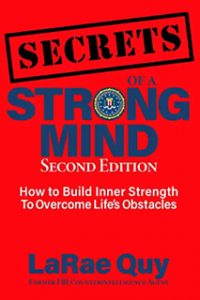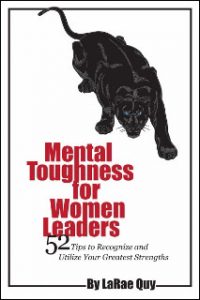FBI agents who work undercover are given a series of psychological tests to determine their level of self-awareness. Self-awareness enables agents to predict their responses when confronted with unexpected situations that can accompany undercover work.
The psychological tests were constructed and administered by the FBI’s Behavioral Science Unit. I attended classes for a week as FBI instructors assessed me. The goal was to drill into me the importance of self-awareness if I was to become a successful undercover agent.
Everything we say and do can affect those around us. Self-knowledge allows us to control our reactions so we aren’t at the mercy of negative behavior patterns. Emotional responses operate below the level of our conscious awareness—from a part of our brain called the basal ganglia. If our initial emotional responses tend to be defensive or negative, we need to find ways to modify them. Before we can change an automated emotional response, however, we have to be aware that it exists! We need self-awareness.
A high degree of self-awareness requires a willingness to tolerate the discomfort of focusing on feelings that may be negative. It can take mental toughness to move through that discomfort because the point is to move through and not wallow in it. Instead, self-awareness invites you to develop a straightforward and honest understanding of what makes you tick. If you are self-aware, you can predict your reaction and take steps to control negative or unproductive emotions.
Are you mentally tough? Take this FREE assessment.
Successful people understand why they do well, what motivates them, and which people and/or situations push their buttons.
If you are self-aware, you are far more likely to pursue the right opportunities, use your strengths, and keep your emotions from holding you back. It improves your ability to direct your life.
He who knows others is wise. He who knows himself is enlightened—Lao Tzu
Here are the best ways to develop self-awareness:
1. Don’t Treat Your Emotions As Either Friends Or Enemies
It’s far too simplistic, and childish, to divide your emotions into two piles: good and bad. If you try to label them, you lose your ability to be aware of them.
We tend to avoid bad emotions because we don’t want them. We may feel ashamed to acknowledge a negative reaction. Good emotions are regarded as positive and something we want. We may not monitor them as we should because hey, all good emotions are friends, right? Unfortunately, the pursuit of positive emotions only can produce a hedonistic lifestyle that’s not based in reality.
The truth is: we need both good and bad emotions to function as healthy human beings in this world. Don’t label your emotion; instead, become aware of each and every emotion but don’t judge it. Observe it, let it run its course, and remind yourself that the feeling was there to help you understand something about yourself.
Emotions can make you feel:
- Happy because you’ve reached your goal.
- Sad because you lost something.
- Frustrated because your career has moved in a different direction.
- Excited because a new adventure is around the corner.
- Angry because you’ve been cheated.
How To Make It Work For You: Observe the emotion for what it is. Try to understand what your mind wants to tell you. If you don’t judge your emotion, it will run its course and not take control of you.
2. Understand Your Life Story

Psychologists have begun to focus on a new field of research called narrative identity. Psychologist Dan McAdams explains that the stories we tell ourselves about our lives don’t just shape our personalities—they are our personalities.
Our narrative identity integrates our reconstructed past with our imagined future to provide us with purpose and direction in life. When we understand our life’s story, we begin to find redemptive meanings to the suffering and adversity we’ve faced in life in the past. When we confront life’s challenges, those redemptive meanings help to develop our self-awareness.
How To Make It Work For You:
- Look at your early life story and identify the people, events, and experiences that had the greatest impact on you.
- In what situations do you find yourself a natural leader? Follower?
- How do you look at the setbacks in your life?
- What have they taught you? About yourself? About others?
3. Learn What Pushes Your Buttons
We all have buttons that produce predictable reactions. When the right ones are pushed, we can scream, throw tantrums, or burn with anger. Knowing who, or what, pushes your buttons and how it happens is critical to developing the ability to take control of the situation.
If you know where your buttons are and what triggers them, this understanding of yourself opens the door so you can manage your response. You’re no longer the victim of an uncontrollable situation. You will have improved emotional intelligence that allows you the ability to control the outcome.
Emotions often show up uninvited and unexpected but they serve an important purpose—they’re clues you need to pay attention to in order to fully understand yourself.
How To Make It Work For You: Even when the emotions are painful, you need to trace them back to their origin to understand their purpose. Pay attention to them, and spend time looking for why this emotion surfaced at this time, who triggered it, and in what context?
4. Re-evaluate Your Values

Most people charge out of the chute when they get out of school. They get a job that sounds exciting and work hard to distinguish themselves from the rest of the pack. They’re young and talented enough to nip at the heels of the older and more experienced folks ahead of them. As soon as the older folks start to flail and fall back, the younger crop runs over them and moves further up the ladder.
We might start a family, buy a house, and dream of our future. In short, we do all the things that society tells us to do to pursue happiness. After a few years, however, two things happen to us: we age, and we grow up.
A new generation arrives on the scene, straight out of school, and full of energy. Now we are the older folks who feel the younger ones nip at our heels. We look over our shoulders to keep from being run over and a new sense of fear and desperation starts to creep in. If we’re not committed and passionate about our job, that downward trajectory is the price we pay for staying in a mediocre career that hasn’t fed our soul.
Some find success to be exactly what they expected and worked so hard to achieve. Their ego loves the victories and they never tire in their pursuit of more fame or money. There is always something they can do to make themselves happier and more admired. The celebration of self never tires for some.
Others, however, find success doesn’t always bring satisfaction. We yearn for something more in life. This disruption can be forced upon us, such as illness or losing a job, or it can be an emptiness we discover on our own. We realize that society’s rules prepare us only for a life where success is measured by money and toys. Instead of things to inspire us, we look for relationships to fulfill us.
How To Make It Work For You: Self-awareness provides you the ability to look deeper into yourself. Revisit your values on a regular basis and ask these questions:
- Does your career go in the direction you want to?
- Does your job require you to do things with which you are not comfortable?
- Do your colleagues treat you the way you would like to be treated?
- Do you have enough time for your family?
- Does your current path lead to where you want to be in 2 years?
© 2019 LaRae Quy. All rights reserved.
You can follow me on Twitter, Facebook, Instagram, AND LinkedIn
Are you mentally tough? Take this evidence-based, FREE Mental Toughness Assessment
Check out my new online training program at www.SecretsOfAStrongMind.com
Get my new book, “Secrets of a Strong Mind (second edition): How To Build Inner Strength To Overcome Life’s Obstacles”

Author of “Mental Toughness for Women Leaders: 52 Tips To Recognize and Utilize Your Greatest Strengths”



I love your post especially the exercise you shared about understanding your life story. To be self-aware we need to see how we have evolved and what parts of our story have made the greatest impact. I always like to ask participants in my leadership programs to think of a great leader and what qualities made them so impactful. Those characteristics have often guided the leader we are today. Thanks LaRae!